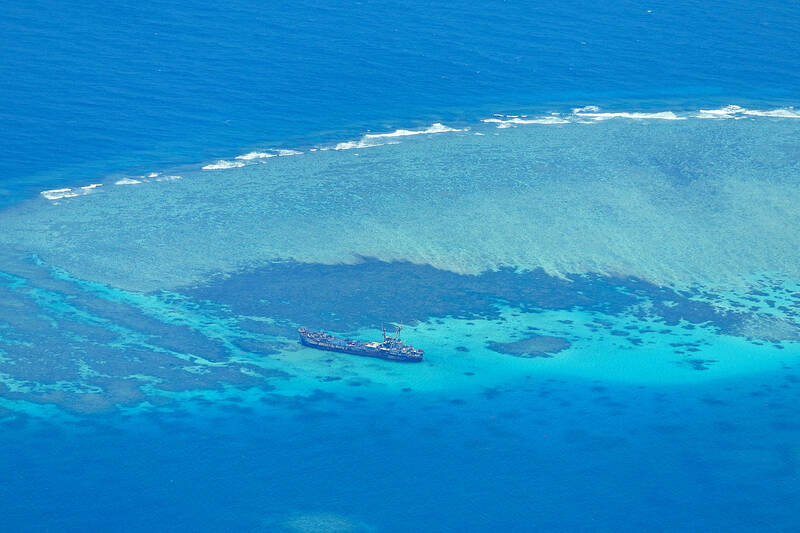Chinese naval and air forces conducted patrols around a flashpoint reef in the South China Sea yesterday, after a slew of tense encounters with the Philippines over the past few months.
The patrols coincided with joint exercises carried out by the US, Australia, Japan, New Zealand and the Philippines in Manila’s exclusive economic zone and within the South China Sea.
Beijing claims almost the entire South China Sea, brushing off rival claims of several countries, including Taiwan and the Philippines, and an international ruling that its assertion has no legal basis.

Photo: Reuters
Its claims include the waters around Scarborough Shoal (Huangyan Island, 黃岩島) — which Beijing seized from Manila in 2012 — where the Chinese People’s Liberation Army’s Southern Theater Command yesterday said it held air and sea patrols.
The triangular chain of reefs and rocks is 240km west of the Philippines’ main island of Luzon and about 900km from the nearest major Chinese land mass of Hainan.
Beijing said the training activities around the shoal included “reconnaissance, early warning, and air-sea patrols.”
“Certain countries outside the region are stirring up trouble in the South China Sea, creating instability in the region,” the Southern Theater Command said in a statement.
“China holds indisputable sovereignty over Huangyan Island and its adjacent waters,” it added.
The Japanese Ministry of Defense in a statement said that a joint drill involving the five countries took place in the South China Sea.
Its maritime destroyer Sazanami participated in the exercises, the ministry said.
The US said the maritime exercises conducted with its allies demonstrated “a collective commitment to strengthen regional and international cooperation in support of a free and open Indo-Pacific.”
The Australian Department of Defence said that the HMAS Sydney and a Royal Australian Air Force P-8A Poseidon maritime patrol aircraft were participating in exercises aimed at “upholding the right to freedom of navigation and overflight.”
Tensions between China and the Philippines have flared in the past few months during a series of confrontations in the waters around the contested Second Thomas Shoal (Renai Shoal, 仁愛暗沙) and Sabina Shoal (Xianbin, 仙濱暗沙).
In July, the two sides said they had reached a provisional deal on resupply missions to a Philippine ship, the Sierra Madre, which is grounded on the Second Thomas Shoal with a garrison on board, aimed at asserting Manila’s claims to the reef.
Beijing on Friday said it had “supervised” a Philippine ship as it delivered supplies as part of a resupply mission to the grounded vessel at the shoal.

AIR SUPPORT: The Ministry of National Defense thanked the US for the delivery, adding that it was an indicator of the White House’s commitment to the Taiwan Relations Act Deputy Minister of National Defense Po Horng-huei (柏鴻輝) and Representative to the US Alexander Yui on Friday attended a delivery ceremony for the first of Taiwan’s long-awaited 66 F-16C/D Block 70 jets at a Lockheed Martin Corp factory in Greenville, South Carolina. “We are so proud to be the global home of the F-16 and to support Taiwan’s air defense capabilities,” US Representative William Timmons wrote on X, alongside a photograph of Taiwanese and US officials at the event. The F-16C/D Block 70 jets Taiwan ordered have the same capabilities as aircraft that had been upgraded to F-16Vs. The batch of Lockheed Martin

GRIDLOCK: The National Fire Agency’s Special Search and Rescue team is on standby to travel to the countries to help out with the rescue effort A powerful earthquake rocked Myanmar and neighboring Thailand yesterday, killing at least three people in Bangkok and burying dozens when a high-rise building under construction collapsed. Footage shared on social media from Myanmar’s second-largest city showed widespread destruction, raising fears that many were trapped under the rubble or killed. The magnitude 7.7 earthquake, with an epicenter near Mandalay in Myanmar, struck at midday and was followed by a strong magnitude 6.4 aftershock. The extent of death, injury and destruction — especially in Myanmar, which is embroiled in a civil war and where information is tightly controlled at the best of times —

Taiwan was ranked the fourth-safest country in the world with a score of 82.9, trailing only Andorra, the United Arab Emirates and Qatar in Numbeo’s Safety Index by Country report. Taiwan’s score improved by 0.1 points compared with last year’s mid-year report, which had Taiwan fourth with a score of 82.8. However, both scores were lower than in last year’s first review, when Taiwan scored 83.3, and are a long way from when Taiwan was named the second-safest country in the world in 2021, scoring 84.8. Taiwan ranked higher than Singapore in ninth with a score of 77.4 and Japan in 10th with

SECURITY RISK: If there is a conflict between China and Taiwan, ‘there would likely be significant consequences to global economic and security interests,’ it said China remains the top military and cyber threat to the US and continues to make progress on capabilities to seize Taiwan, a report by US intelligence agencies said on Tuesday. The report provides an overview of the “collective insights” of top US intelligence agencies about the security threats to the US posed by foreign nations and criminal organizations. In its Annual Threat Assessment, the agencies divided threats facing the US into two broad categories, “nonstate transnational criminals and terrorists” and “major state actors,” with China, Russia, Iran and North Korea named. Of those countries, “China presents the most comprehensive and robust military threat